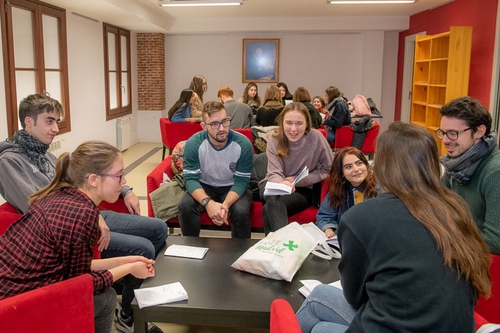Commented Bible Passages
September
Jesus went to Nazareth, where he had been brought up, and on the Sabbath day he went into the synagogue, as was his custom. He stood up to read, and the scroll of the prophet Isaiah was handed to him. Unrolling it, he found the place where it is written:“The Spirit of the Lord is on me, because he has anointed me to proclaim good news to the poor. He has sent me to proclaim freedom for the prisoners and recovery of sight for the blind, to set the oppressed free, to proclaim the year of the Lord’s favor.”Then he rolled up the scroll, gave it back to the attendant and sat down. The eyes of everyone in the synagogue were fastened on him. He began by saying to them, “Today this scripture is fulfilled in your hearing.”All spoke well of him and were amazed at the gracious words that came from his lips. “Isn’t this Joseph’s son?” they asked. Jesus said to them, “Surely you will quote this proverb to me: ‘Physician, heal yourself!’ And you will tell me, ‘Do here in your hometown what we have heard that you did in Capernaum.’”“Truly I tell you,” he continued, “no prophet is accepted in his hometown. I assure you that there were many widows in Israel in Elijah’s time, when the sky was shut for three and a half years and there was a severe famine throughout the land. Yet Elijah was not sent to any of them, but to a widow in Zarephath in the region of Sidon. And there were many in Israel with leprosy in the time of Elisha the prophet, yet not one of them was cleansed—only Naaman the Syrian.”All the people in the synagogue were furious when they heard this. They got up, drove him out of the town, and took him to the brow of the hill on which the town was built, in order to throw him off the cliff. But he walked right through the crowd and went on his way. (Luke 4:14-30)
This short account of Jesus’ visit to his hometown is disturbing: how could he stand such a change? At the beginning people are amazed at him, and then all at once the crowd seems to turn into a lynch-mob.
The people are all waiting for the Messiah (Luke 3:15), who was to come in order to create communion with God and among human beings.
Jesus’ reputation precedes him (Luke 4:14)—undoubtedly as well as news of his healings and his concern for the poorest of society, who feel close to him—and this is true for the people in Nazareth, too. Now he comes to his hometown himself, to proclaim the Good News of God’s Kingdom there as well.
After Jesus reads out the words of Isaiah, all those present in the synagogue open their eyes wide: they see in the man standing before them the Messiah announced by the prophets and then by John. And Jesus himself confirms this: “Today this scripture is fulfilled” (Luke 4:21).
Looking with amazement is, in the Bible, the constantly repeated reaction of human beings to an encounter with God. Have not we too experienced this wonder during meetings or experiences that allow us to glimpse something of God’s presence?
Following this acclamation, the question “Isn’t this Joseph’s son?” marks a turning-point. Instead of common rejoicing at God’s presence, a doubt insinuates itself, almost undetected, into the assembly: Is he not one of us, a simple man who left town and now all of a sudden, promoted to a higher rank, comes back? Why him? Does he still belong to us?
At that time, as today, people looked at themselves and others, often unconsciously, comparing and delimiting in order to define who belongs to a community and who remains outside: between neighbors in the small town of Nazareth, or with the inhabitants of neighboring Capernaum, in families, at work, or in one’s circle of friends. Such behavior creates a safe haven and bonds people together.
But as soon as the eyes that were at first turned towards Jesus begin to turn away from him and compare—worrying about their own standing—Jesus seems to become a danger that needs to be done away with.
With examples taken from Bible history, Jesus tries to explain that the community formed by God does not come into being in this way. When God becomes human—coming as close to us as the son of their neighbor Joseph—in order to open a way of communion, he goes beyond all human borders and calls into question the order of society which sets “ours” in contrast to “theirs.”
So as more and more to be people of communion, this text invites us to keep our eyes focused on Christ. Then our way of looking at ourselves and others gradually changes. We discover that it is not our boundaries that make community possible, but rather that he is the one who brings us together.
![]() How do we look at ourselves and other people? Why is it that so often we compare ourselves to others?
How do we look at ourselves and other people? Why is it that so often we compare ourselves to others?
![]() What holds our communities together? What divides them?
What holds our communities together? What divides them?
![]() What turns my eyes away from Christ? What helps me to keep my eyes focused on Christ with amazement?
What turns my eyes away from Christ? What helps me to keep my eyes focused on Christ with amazement?
 TAIZÉ
TAIZÉ